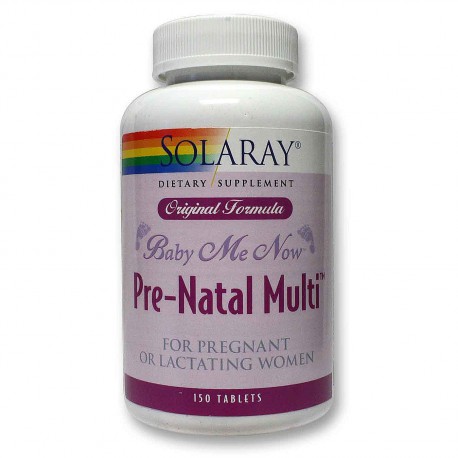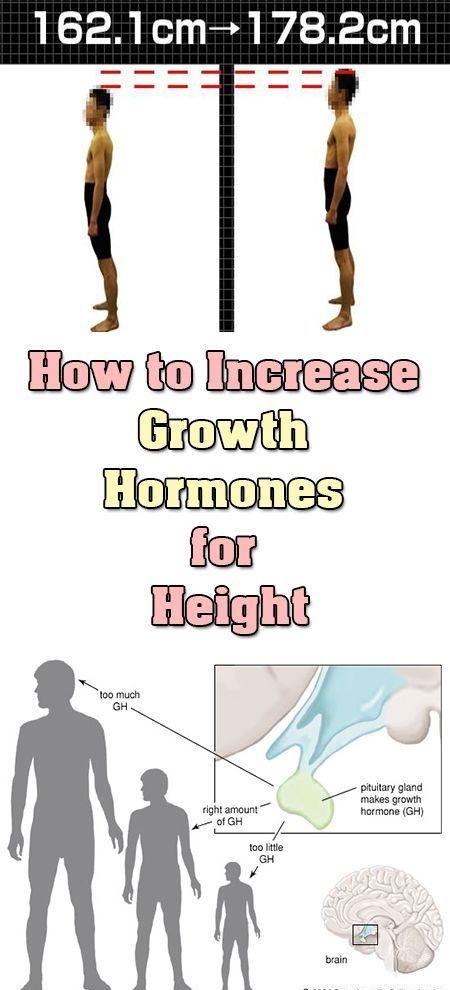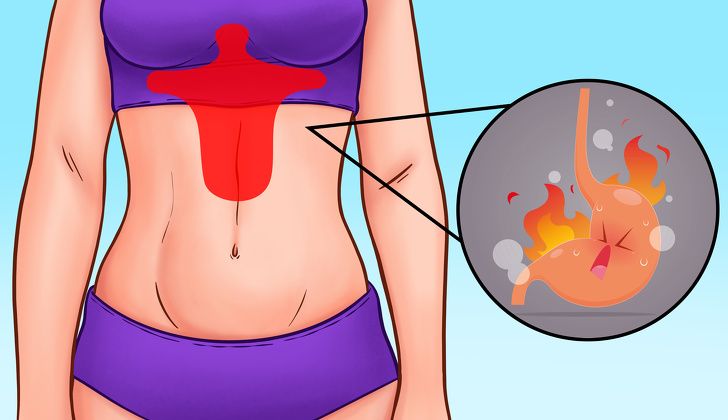Benefit of taking prenatal vitamins
The Benefits of Prenatal Vitamins for Your Pregnancy
Taking a daily prenatal vitamin is one of the easiest things you can do to help encourage a healthy pregnancy. When combined with a well-balanced diet, prenatal vitamins help ensure that you and your baby are receiving the vital nutrition that is necessary throughout every stage of pregnancy.
Why Prenatal Vitamins Are Important
During your pregnancy, your body’s nutritional requirements are different than at other times, and prenatal vitamins are designed for the specific needs of pregnant women. For example, prenatal vitamins have more iron, calcium, and folic acid than regular multivitamins. Folic acid, in particular, is an important part of any diet, but it is imperative for the pregnant woman. Folic acid is proven to be a crucial factor in preventing neural tube birth defects, which is why it is recommended that all women of child bearing age take a folic acid supplement, and also why pregnant women need to take more than the general population.
Prenatal Vitamins Supplement, Not Replace a Balanced Diet
Any balanced diet will contain plenty of vitamins and minerals, but you should still take a prenatal vitamin to make sure that you are getting enough of the nutrients your body and your baby needs. Additionally, since prenatal vitamins are formulated with the idea that the person taking them is eating a healthy diet, there is no need to seek out additional vitamin supplements in any form, be it a pill, diet drink, or fortified smoothie. Be sure to let your doctor know if you use any of these products so you can be certain you are not getting too much of a good thing.
Over-the-Counter vs. Prescription Prenatal Vitamins
Prenatal vitamins are available over-the-counter or through a doctor’s prescription. Some people prefer to get their prenatal vitamins from a prescription because it increases the likelihood that the prenatal vitamins are high quality and, if you have particular dietary needs, a vitamin can be prescribed specifically for you.
If you choose to purchase your prenatal vitamins over-the-counter, it is very important to read labels so you know how much of which vitamins and minerals you are taking. As general rule, look for a prenatal vitamin that contains folic acid, iron, calcium, and Omega-3 fatty acids (specifically DHA). Other key nutrients to look out for are vitamin C, vitamin D, vitamin E, and zinc. However, be aware that it is possible to have too much of some vitamins and minerals, such as Vitamin A, so make sure you know the appropriate dosages for you. Have the conversation with your obstetrician if you’re not sure.
Many diet and vitamin supplements that are sold at grocery and health food stores are not subject to the same kind of regulation and scrutiny as prescription prenatal vitamins. If you opt to buy yours over-the-counter, make sure you know what you are taking. It is always best to buy well known brands from reputable stores.
Some organizations also independently rate supplements, so if you want extra assurance that your prenatal vitamins meet a high quality standard, look for labels marked with seals of approval from organizations such as NSF International or the U.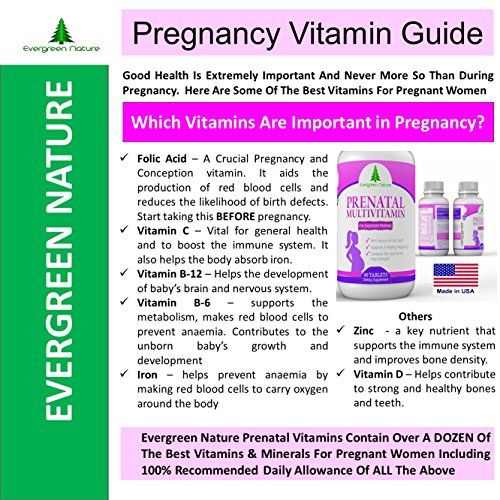 S. Pharmacopeial Convention and always discuss your choice with your doctor.
S. Pharmacopeial Convention and always discuss your choice with your doctor.
Don’t Stop Taking Your Prenatal Vitamins
Sometimes people experience discomfort when taking prenatal vitamins. Queasiness and constipation are common complaints, and some people struggle with swallowing large pills. It might be tempting to quit but it is very important that you keep taking a daily prenatal vitamin as advised through your pregnancy. Tell your doctor about any difficulties you are experiencing and they will help devise solutions for taking your prenatal vitamins without the unpleasant side effects.
Prenatal Vitamins Not Just for Women Who Are Already Pregnant
Prenatal vitamins are not exclusive to the nine months of pregnancy. It is prudent to begin taking prenatal vitamins before you get pregnant so that you and your baby receive maximum nutrition during the first few weeks of pregnancy when fetal development is at its most active, which is often before many women are even aware that they are pregnant. Your health care provider may also recommend that you continue taking prenatal vitamins for several months after the baby is born, especially if you are breastfeeding.
Your health care provider may also recommend that you continue taking prenatal vitamins for several months after the baby is born, especially if you are breastfeeding.
How to Choose a Prenatal Vitamin
Choosing which prenatal vitamin to take can feel like an overwhelming task, but the most important thing to remember is simply that you should take one. Prenatals are an essential part of a healthy pregnancy and there are lots of options to discuss with your doctor are having trouble deciding which is best for you.
Below are the recommended guidelines for key vitamins and minerals during pregnancy, according to the American Congress of Obstetricians & Gynecologists.
Calcium
Daily Recommended Dietary Amount
1,300 milligrams for ages 14–18 years; 1,000 milligrams for ages 19–50 years
Why You and Your Baby Need It
Builds strong bones and teeth
Best Sources
Pasteurized milk, cheese, and yogurt; sardines; dark, leafy greens
Iron
Daily Recommended Dietary Amount
27 milligrams
Why You and Your Baby Need It
Helps red blood cells deliver oxygen to your baby
Best Sources
Lean red meat, poultry, fish, dried beans and peas, iron-fortified cereals, prune juice
Vitamin A
Daily Recommended Dietary Amount
770 micrograms
Why You and Your Baby Need It
Forms healthy skin and eyesight; helps with bone growth
Best Sources
Carrots, dark green leafy vegetables, sweet potatoes
Vitamin C
Daily Recommended Dietary Amount
85 milligrams
Why You and Your Baby Need It
Promotes healthy gums, teeth, and bones; helps your body absorb iron
Best Sources
Citrus fruit, broccoli, tomatoes, strawberries
Vitamin D
Daily Recommended Dietary Amount
600 international units
Why You and Your Baby Need It
Builds your baby’s bones and teeth; helps promote healthy eyesight and skin
Best Sources
Sunlight, fortified milk, fatty fish such as salmon
Vitamin B
6Daily Recommended Dietary Amount
1.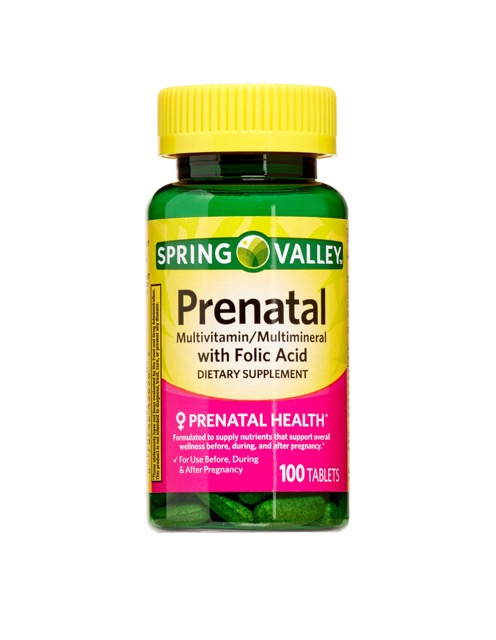 9 milligrams
9 milligrams
Why You and Your Baby Need It
Helps form red blood cells; helps body use protein, fat, and carbohydrates
Best Sources
Beef, liver, pork, ham, wholegrain cereals, bananas
Vitamin B
12Daily Recommended Dietary Amount
2.6 micrograms
Why You and Your Baby Need It
Maintains nervous system; needed to form red blood cells
Best Sources
Meat, fish, poultry, milk (vegetarians should take a supplement)
Folic Acid
Daily Recommended Dietary Amount
600 micrograms
Why You and Your Baby Need It
Helps prevent birth defects of the brain and spine
Best Sources
Dark green leafy vegetables, orange juice, beans, fortified cereals, enriched bread and pasta, nuts
Source: American College of Obstetricians and Gynecologists. Nutrition During Pregnancy. Patient Education Pamphlet AP001. Washington, DC: American College of Obstetricians and Gynecologists; 2015.
Patient Education Pamphlet AP001. Washington, DC: American College of Obstetricians and Gynecologists; 2015.
If you have any questions about which prenatal vitamins are right for your pregnancy, please contact Kansas City ObGyn today at This email address is being protected from spambots. You need JavaScript enabled to view it. or 913-948-9636.
Prenatal Vitamins While Not Pregnant: Can I Take Them?
The famous saying about pregnancy is that you’re eating for two. And while you might not actually need that many more calories when you’re expecting, your nutritional needs do increase.
To ensure that expectant moms are getting enough vitamins and minerals, they’ll often take a prenatal vitamin. Prenatal vitamins are associated with reducing risks for pregnancy complications like neural tube defects and anemia.
With so many benefits, it’s easy to wonder if you should take them even if you aren’t expecting or trying to get pregnant. But for the most part, if you aren’t thinking about bringing a little one into the world, the majority of your nutrients should come from your diet — not a vitamin.
Here’s a look at the risks and benefits of taking prenatal vitamins.
The vitamin aisle at your local pharmacy contains a huge assortment of vitamins for different genders and ages. Prenatal vitamins are specifically geared toward women thinking about becoming pregnant or who are pregnant.
The concept behind prenatal vitamins is that some of a women’s nutritional and vitamin needs increase with pregnancy. A baby especially needs certain nutrients to develop. Expectant moms don’t always take in enough nutrients in their daily diets. Prenatal vitamins are meant to bridge the nutritional gap.
It’s important to remember that prenatal vitamins are a supplement to a healthy diet for expectant moms. They aren’t a replacement for a healthy diet.
Lots of different prenatal vitamin types are available on the market. While there’s not a specific formulation for all prenatal vitamins, you’ll likely find that prenatal vitamins contain at least these key nutrients:
Calcium.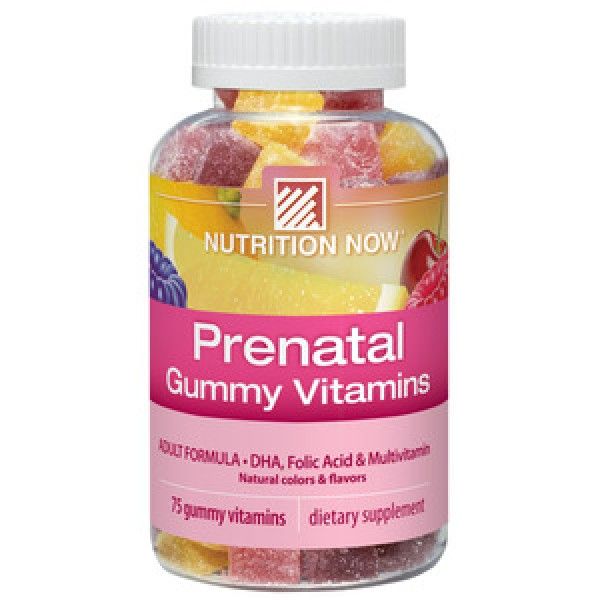 According to the Mayo Clinic, pregnant and adult women need 1,000 milligrams (mg) of calcium daily. Prenatal vitamins typically have between 200 and 300 mg of calcium. This contributes to a woman’s calcium requirements but doesn’t account for all of her daily calcium needs. Calcium is important for all women because it keeps their bones strong.
According to the Mayo Clinic, pregnant and adult women need 1,000 milligrams (mg) of calcium daily. Prenatal vitamins typically have between 200 and 300 mg of calcium. This contributes to a woman’s calcium requirements but doesn’t account for all of her daily calcium needs. Calcium is important for all women because it keeps their bones strong.
Folic acid. Taking in enough folic acid is linked with reducing neural tube defects like spina bifida. The American College of Obstetricians and Gynecologists recommends that pregnant women (and those trying to get pregnant) take in 600 micrograms (mcg) of folic acid every day from all sources. Since it may be difficult to get this much folic acid from foods alone, a supplement is recommended.
Foods that have folic acid (also known as folate) include beans, leafy green vegetables, asparagus, and broccoli. Many fortified foods including cereal, bread, and pasta have folate too.
Iron. This mineral is necessary to create new red blood cells in the body.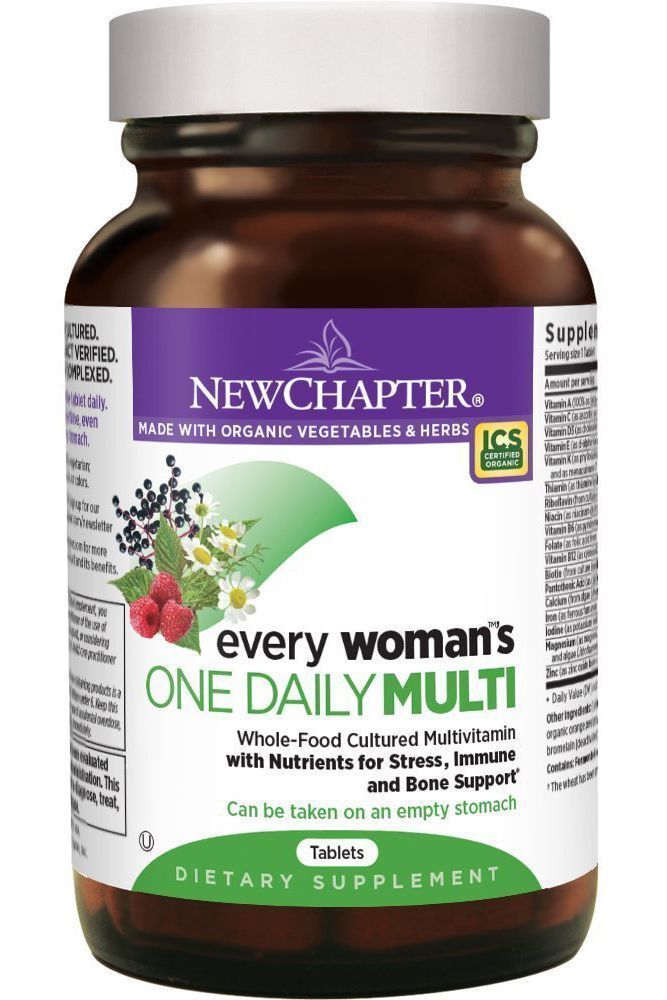 Because a woman increases her blood volume during pregnancy, iron is a must-have. According to the Mayo Clinic, pregnant women need 27 mg of iron a day. This is 8 mg more than women who aren’t pregnant.
Because a woman increases her blood volume during pregnancy, iron is a must-have. According to the Mayo Clinic, pregnant women need 27 mg of iron a day. This is 8 mg more than women who aren’t pregnant.
Prenatal vitamins often contain other vitamins and minerals. These could include:
- omega-3 fatty acids
- copper
- zinc
- vitamin E
- vitamin A
- vitamin C
Always talk with your doctor before starting to take prenatal vitamins. If you’re trying to conceive or are pregnant, your doctor will likely recommend that you take them.
While you can buy prenatal vitamins over the counter, doctors can prescribe them too. Women who are carrying multiples, pregnant teenagers, and pregnant women with a history of substance abuse have a higher risk of vitamin and mineral deficiencies. Prenatal vitamins are particularly important for these women.
Doctors often recommend that women who are breastfeeding also continue taking prenatal vitamins after delivery.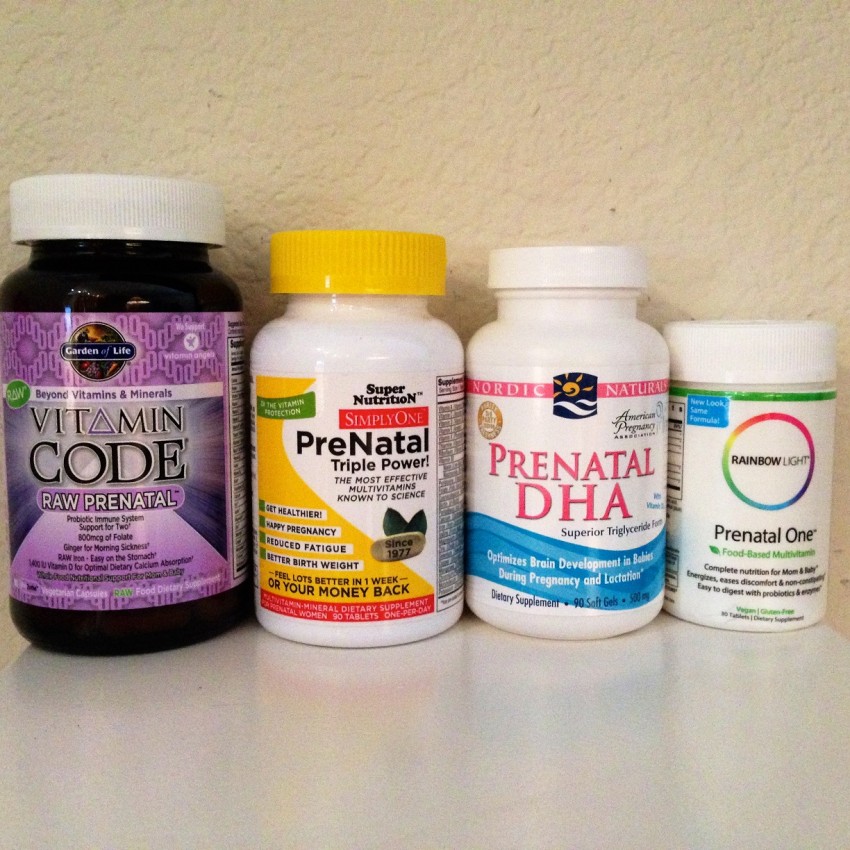 Prenatal vitamins can serve as a further supplement to lactating women who need plenty of nutrients to make breast milk.
Prenatal vitamins can serve as a further supplement to lactating women who need plenty of nutrients to make breast milk.
Even if you aren’t trying to get pregnant, you still might want to take a folic acid supplement. That’s because half of the pregnancies in the United States aren’t planned. Because the brain and spinal cord are already forming at the early stages of pregnancy, folic acid is vital. Women of childbearing age could also eat more folate-rich foods as an alternative to taking a supplement.
Prenatal vitamins are specific to the needs of pregnant and breastfeeding women. They’re geared to make up the common nutritional deficiencies a pregnant woman could have. But they aren’t really intended for women (or men) who aren’t expecting or lactating.
Taking too much folic acid each day can have the adverse side effect of masking a vitamin B-12 deficiency. Excess iron can be a problem, too. Getting too much iron is associated with health problems like constipation, nausea, and diarrhea.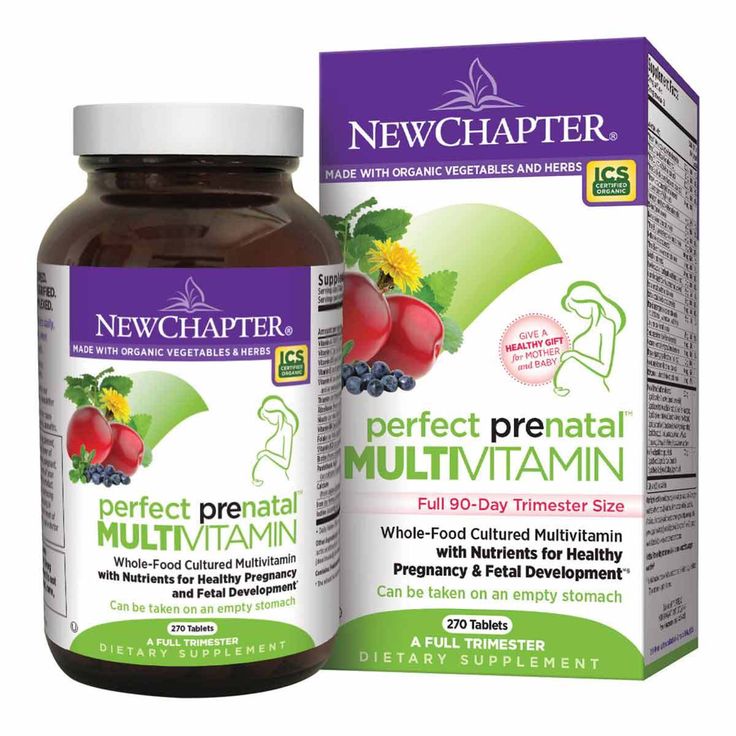
Excess amounts of nutrients like vitamin A taken from synthetic vitamins could be toxic to a person’s liver.
Again, it’s better if you get these nutrients through your diet instead of a pill. For these reasons, most women should skip prenatal vitamins unless their doctors tell them otherwise.
Many women claim that prenatal vitamins affect hair and nail growth. Some claim that taking prenatal vitamins makes hair grow thicker or faster, and that nails could grow faster or stronger too.
But according to the Mayo Clinic, these claims haven’t been proven. Taking prenatal vitamins for better hair or nails likely won’t bring the desired results. They could also have adverse side effects.
If you’re considering taking prenatal vitamins and aren’t pregnant, breastfeeding, or trying to conceive, evaluate your diet first. Most people who eat a balanced diet don’t need to take a multivitamin. A balanced diet includes lean proteins, low-fat dairy sources, whole grains, and plenty of fruits and veggies.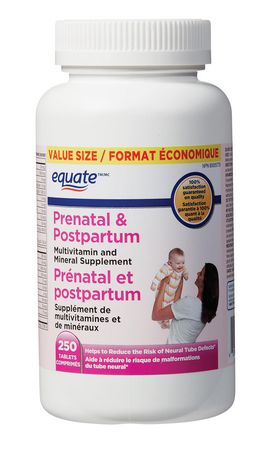
But keep in mind that there are always exceptions to why you may need to take a vitamin or mineral supplement. Maybe your doctor found specific nutrition deficiencies in your diet. In this case, it’s usually better to take a supplement designed to treat your specific deficiency.
Being aware of potentially adverse symptoms can help you determine if you’re experiencing the side effects of excess vitamins or minerals.
Rachel Nall is a Tennessee-based critical care nurse and freelance writer. She began her writing career with the Associated Press in Brussels, Belgium. Although she enjoys writing about a variety of topics, healthcare is her practice and passion. Nall is a full-time nurse at a 20-bed intensive care unit focusing primarily on cardiac care. She enjoys educating her patients and readers on how to live healthier and happier lives.
Vitamins and pregnancy - articles from the specialists of the clinic "Mother and Child"
Albitskaya Elena Vladimirovna
Ultrasound doctor
Clinical hospital Lapino-1 "Mother and Child"
One of the most frequent questions that pregnant women ask their doctor is what vitamins should be taken during pregnancy? Let's say right away whether expectant mothers need to drink pharmaceutical vitamins or not - there is no unequivocal answer to this question.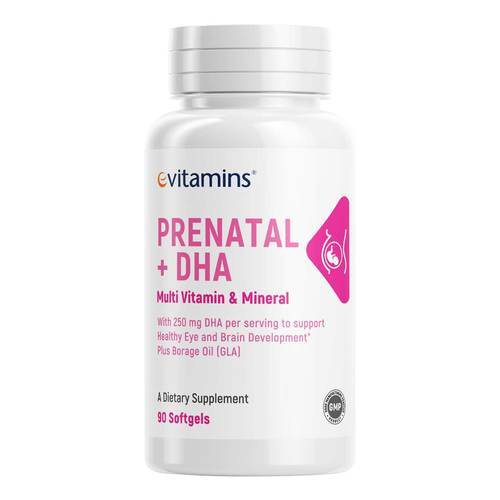 Some doctors believe that the necessary nutrients should be obtained from natural products. Others are in favor of taking pharmaceutical multivitamins. It can only be said unequivocally that vitamins and microelements must necessarily enter the body of a pregnant woman. We will tell you which of them are most important for the expectant mother.
Some doctors believe that the necessary nutrients should be obtained from natural products. Others are in favor of taking pharmaceutical multivitamins. It can only be said unequivocally that vitamins and microelements must necessarily enter the body of a pregnant woman. We will tell you which of them are most important for the expectant mother.
Folic acid
Other names for this vitamin are vitamin B 9 or B c . This vitamin is necessary for cell division and reproduction, so it is especially important in the first trimester of pregnancy, when all organs and systems of the child are being laid. Folic acid plays an important role in the synthesis of hemoglobin, and with its deficiency, anemia can develop. And folic acid also helps to reduce the likelihood of spinal defects in a child, takes care of the correct formation of his psyche and intellect. It is better to start taking folic acid three months before the planned conception, since a small supply of this vitamin will only be useful for both the expectant mother and the baby.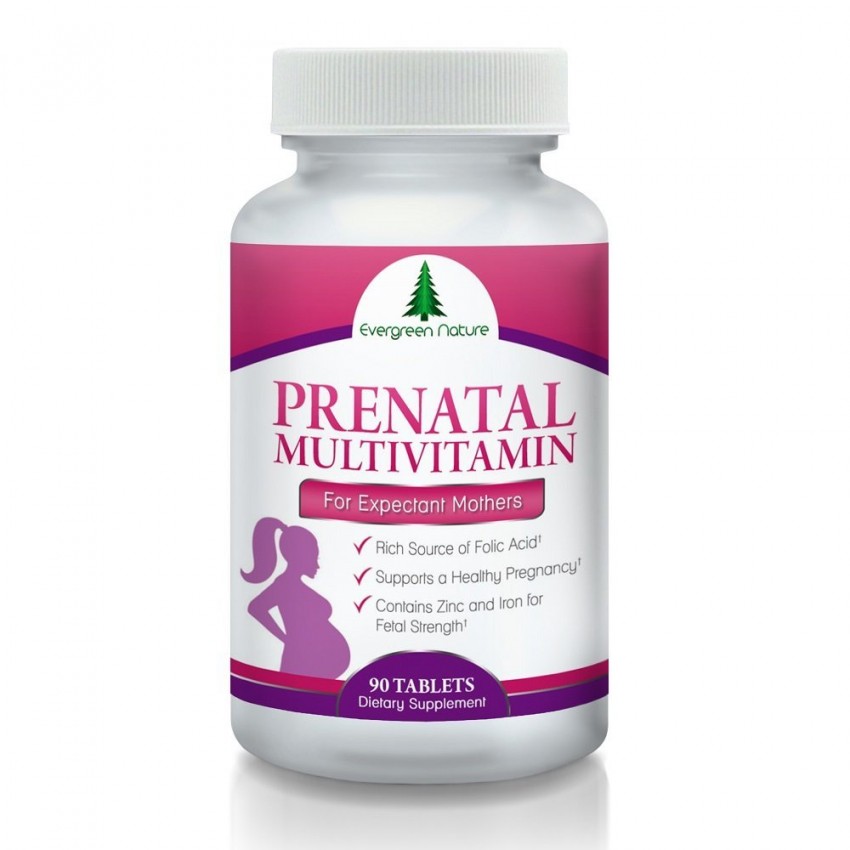 If the pregnancy has come unplanned, then folic acid must be taken as soon as the woman finds out about her situation. On average, the dosage of this vitamin is from 0.4 to 0.8 mg per day.
If the pregnancy has come unplanned, then folic acid must be taken as soon as the woman finds out about her situation. On average, the dosage of this vitamin is from 0.4 to 0.8 mg per day.
Calcium
An expectant mother needs about 1200–1400 mg of calcium daily, while an ordinary woman needs 800–1000 mg of this trace element. Why? During pregnancy, the amount of calcium in the body of the expectant mother is significantly reduced, since it is also spent on the growth and development of the child. Especially a lot of calcium is needed in the third trimester, when the baby's skeleton is calcified. But calcium is needed not only for the growth of bones and teeth of a child - with its help, his nervous system, his heart, muscles, skin tissues, eyes, ears, hair and nails are formed. A pregnant woman needs calcium for the full functioning of the kidneys, the prevention of muscle pain, constipation, osteoporosis, caries and toxicosis. In addition, this trace element protects the expectant mother from stress and nervous overload.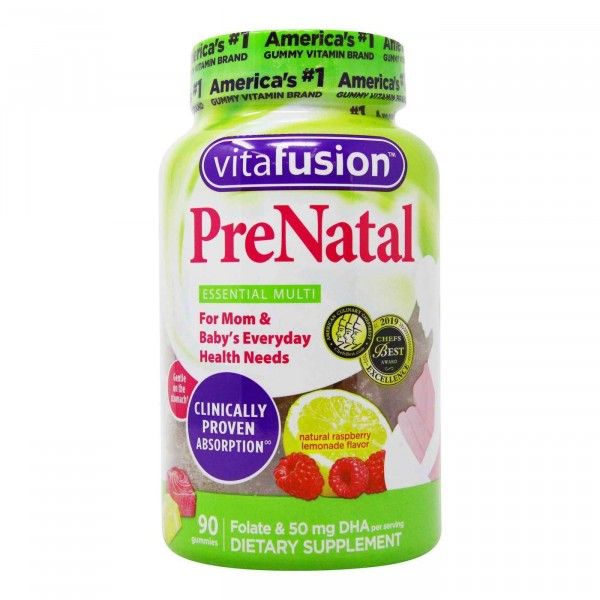
Vitamin E
This vitamin is involved in the process of tissue respiration, it helps oxygen to penetrate into every cell of the body. At the same time, vitamin E is an excellent antioxidant: it protects cells from the formation of free radicals that can provoke various diseases. This protective function is especially important at the stage of embryo formation. In addition, vitamin E helps to normalize the hormonal balance of the body. In the early stages, it participates in the formation of the placenta, and also protects against abortion. The dose of vitamin E during pregnancy is 15 mg.
Vitamin E is found in vegetable oils, not less than this vitamin in lettuce, tomatoes, rose hips, parsley, spinach and peas. Some vitamin E is found in meat, eggs and milk.
Magnesium
Magnesium is involved in all metabolic processes, helps to cope with stress, normalizes the functioning of the cardiovascular system and blood pressure, keeps blood vessels in good shape.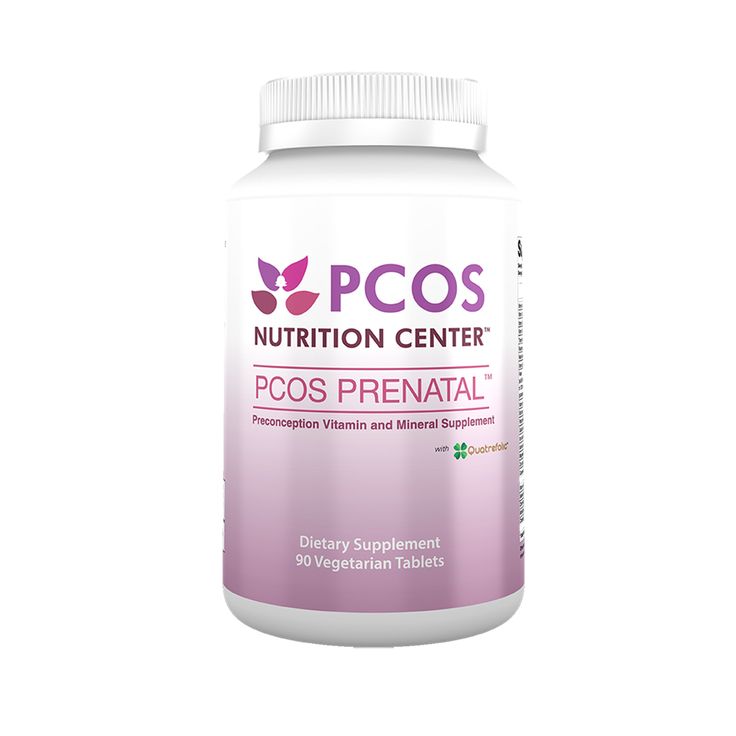 Due to a lack of magnesium in the body, cramps in the muscles (usually in the calves) may appear. And since the uterus is also a muscular organ, with a lack of magnesium during pregnancy during gestation, the excitability of the myometrium increases, which leads to active uterine contractions. Therefore, with hypertension and the threat of abortion, magnesium is often prescribed.
Due to a lack of magnesium in the body, cramps in the muscles (usually in the calves) may appear. And since the uterus is also a muscular organ, with a lack of magnesium during pregnancy during gestation, the excitability of the myometrium increases, which leads to active uterine contractions. Therefore, with hypertension and the threat of abortion, magnesium is often prescribed.
Magnesium is found in whole grains and whole grain breads, figs, almonds, seeds, dark green vegetables and bananas.
iodine
Pregnant women are usually prescribed iodine in the first trimester. Up to 16 weeks of pregnancy, the development of the child and the laying of all its organs and systems are "under the protection" of the mother's thyroid gland. And if a woman has little iodine, then this means that some system or organ of the baby may suffer. And even when the child’s own thyroid gland is formed and starts working, she can still take iodine only from the mother’s body. Its daily dose is 250 mg per day.
Its daily dose is 250 mg per day.
Iodine is most easily obtained from seafood and sea or iodized salt. A lot of iodine is found in sea fish, seaweed, squid, persimmon, feijoa, dates, dried figs, dairy products and meat. However, iodine is destroyed by temperature effects, which means that after heat treatment, the amount of iodine in the products decreases sharply.
Iron
Iron is needed primarily to prevent anemia. After all, it is part of hemoglobin, which carries oxygen throughout the body of the mother and child. In addition, iron is involved in protein synthesis, which is involved in the formation of muscle tissue. And iron deficiency can lead to increased uterine tone. The average daily dosage of iron is 30–60 mg. In some cases, if the woman's iron supply was initially reduced, the dosage may be higher.
Iron is found in meat, especially in veal, turkey, hare, pork and beef. There is iron in plant foods, but from there it is absorbed much worse.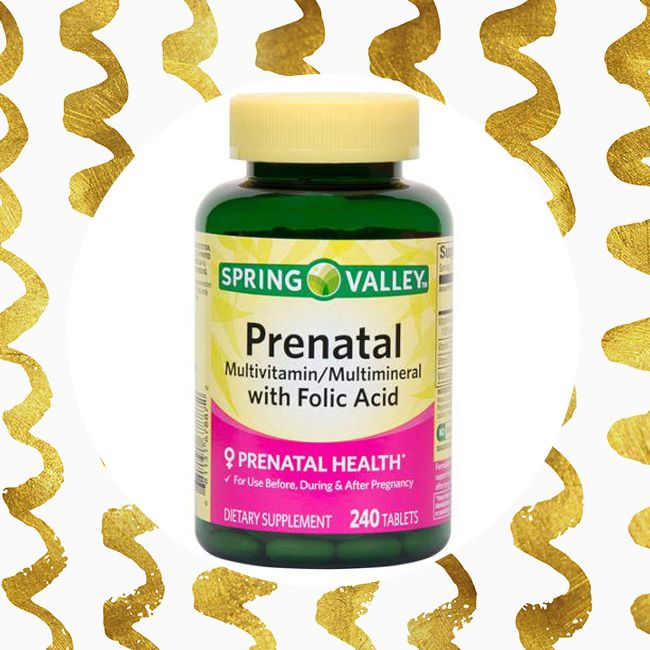 Iron is best absorbed when taken together with vitamin C.
Iron is best absorbed when taken together with vitamin C.
If a pregnant woman eats properly and varied, eats a lot of fruits and vegetables, then she may not need an additional complex of vitamins for pregnant women. It may be necessary to drink some vitamins separately, but this should be determined by the doctor. If, before pregnancy, a woman had signs of vitamin deficiency, she eats incorrectly or poorly, then multivitamins cannot be dispensed with.
Inset
Vitamin B 9 (folic acid) found in animal liver, spinach, asparagus, lentils, Brussels sprouts, beans and wholemeal flour. However, it is absorbed very poorly from food, no more than 50%. That is why it is prescribed to almost all pregnant women
At one time, our body will not be able to absorb more than 500 mg of calcium. Therefore, you should not try to get the entire daily norm of this trace element in one meal. Try to eat foods containing calcium in small portions several times a day
To increase magnesium concentration in tissues, vitamin B 6 (pyridoxine) is needed, which facilitates its absorption and acts as a conductor of magnesium into the cell.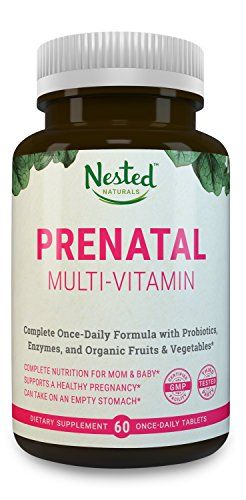 Therefore, magnesium and vitamin B 6 are often prescribed together.
Therefore, magnesium and vitamin B 6 are often prescribed together.
Make an appointment
to the doctor - Albitskaya Elena Vladimirovna
Lapino-1 Clinical Hospital "Mother and Child"
Diagnostics
By clicking on the submit button, I consent to the processing of personal data
Attention! Prices for services in different clinics may vary. To clarify the current cost, select a clinic
Clinical Hospital MD GROUPClinical Hospital Lapino-1 "Mother and Child"Clinic KG "Lapino" in Odintsovo (branch)Clinic "Mother and Child" Khodynskoye PoleClinic "Mother and Child" KuntsevoClinic "Mother and Child" SavelovskayaClinic "Mother and Child" Yugo-ZapadMother and Child Clinic NovogireyevoMother and Child Clinic Lefortovo
All directionsSpecialist consultations (adults)Specialist consultations (children)Laboratory of molecular geneticsGeneral clinical examinationsProcedural roomTelemedicine for adultsTherapeutic examinationsUltrasound examinations for adults
01.
Specialist consultations (adults)
02.
Specialist consultations (children)
03.
Laboratory of molecular genetics
04.
General studies
05.
Procedure room
06.
Television and adults
07.
Therapeutic studies
08.
Ulzvous Valzvous Studies. adults
Nothing found
The administration of the clinic takes all measures to timely update the price list posted on the website, however, in order to avoid possible misunderstandings, we advise you to clarify the cost of services and the timing of the tests by calling
Do pregnant women need to take vitamin preparations?
Almost every woman during pregnancy, doctors recommend taking various vitamin preparations. But do pregnant women need to take vitamins? Is a balanced diet not enough?
Almost every woman during pregnancy, doctors recommend taking various vitamin preparations.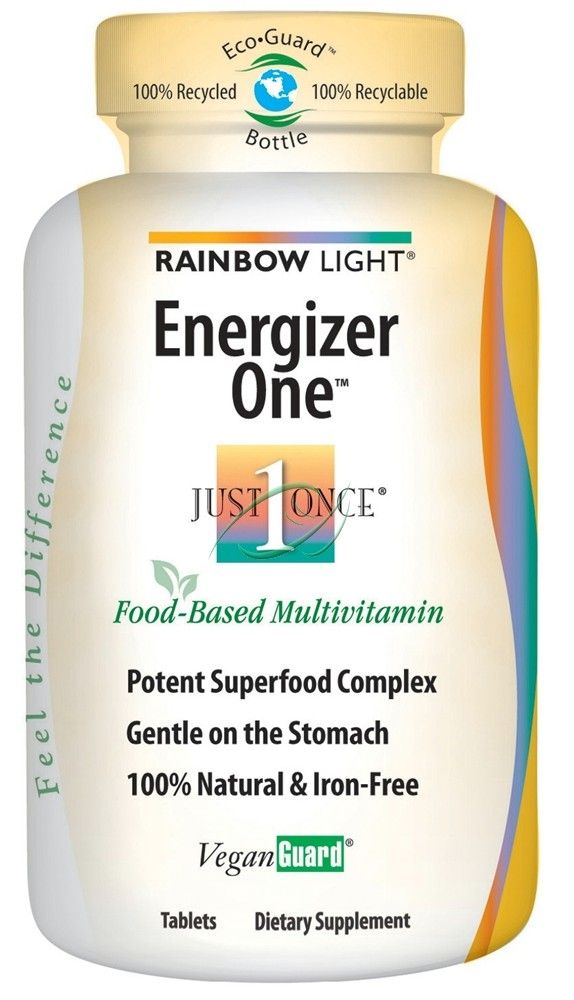 But do pregnant women need to take vitamins? Is a balanced diet not enough? We asked these and other questions to Ekaterina Aleksandrovna Minchenkova, an obstetrician-gynecologist at Expert Clinic Smolensk.
But do pregnant women need to take vitamins? Is a balanced diet not enough? We asked these and other questions to Ekaterina Aleksandrovna Minchenkova, an obstetrician-gynecologist at Expert Clinic Smolensk.
— Ekaterina Alexandrovna, what is the role of vitamins in the body in general and in the body of a pregnant woman in particular?
— Vitamins are special substances that everyone (not only women) need in small amounts for the normal functioning of the body. They are involved in metabolism, they are biological accelerators of chemical reactions occurring in the cells of the body, etc. In a pregnant woman, the need for vitamins and microelements is higher, because the fetus also needs them.
— What vitamins can you get from food?
— Most vitamins are not formed in our body, but come from food. If a pregnant woman eats a full, rational, varied diet, then she does not need an additional intake of vitamins and minerals (with some exceptions).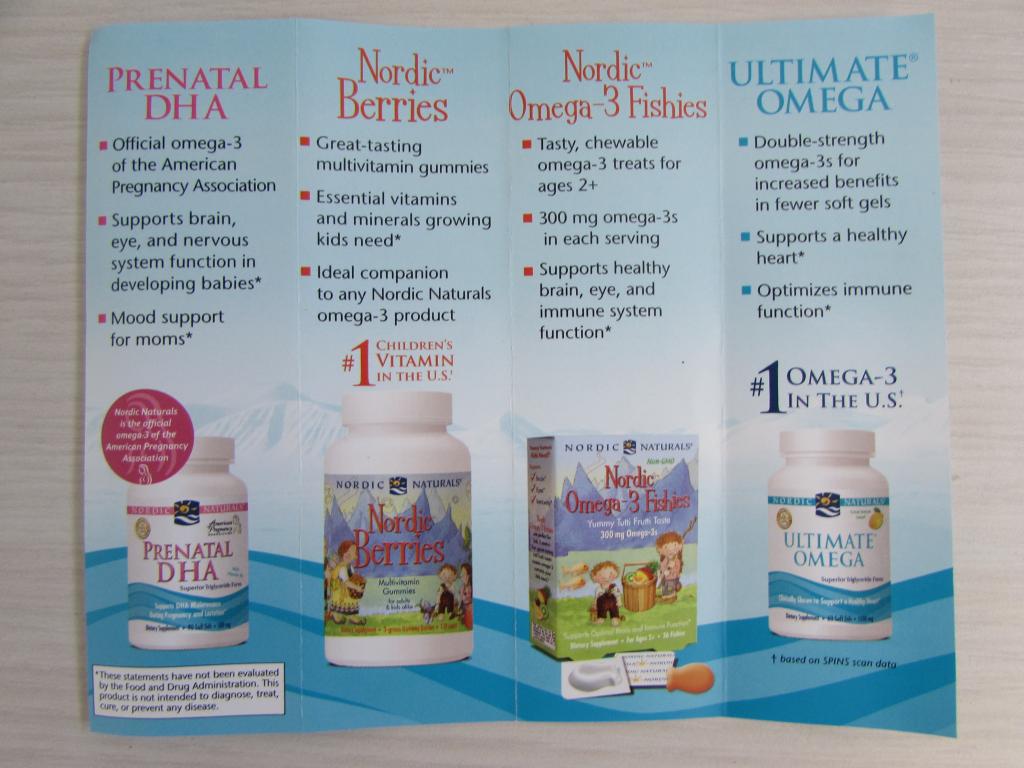 They will be easily obtained with food in sufficient quantities. No vitamin supplement can match the benefits of proper nutrition.
They will be easily obtained with food in sufficient quantities. No vitamin supplement can match the benefits of proper nutrition.
- Speaking of nutrition, you said "with a few exceptions." That is, despite the correct diet, pregnant women should still take some vitamins? And if so, which ones?
Yes. During pregnancy, doctors prescribe some vitamins and minerals, even if the woman eats normally. I will dwell on those that I consider the most important. Vitamin number 1 for pregnant women is vitamin B9, or folic acid. Probably, one could do without additional intake of other vitamins, but without folic acid - in any way. This is because the strongest evidence for the need for vitamin supplementation during pre-pregnancy and the first 12 weeks of pregnancy is only for folic acid. With a lack of this vitamin, the likelihood of neural tube defects in the fetus, as well as some other defects (cleft lip, palate, congenital heart defects, malformations of the urinary tract and extremities, congenital hydrocephalus) may increase.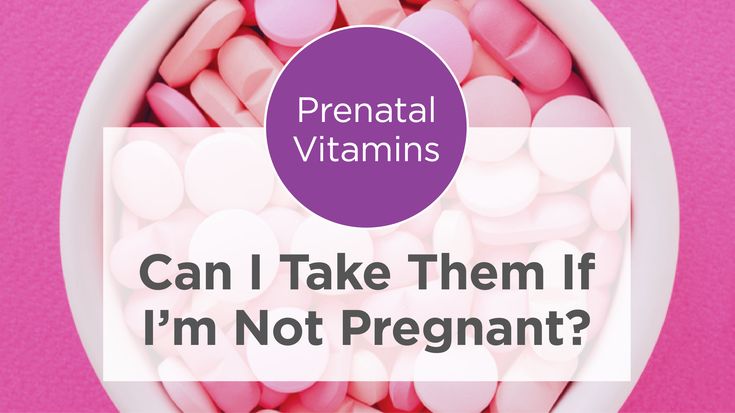
The recommended dose of folic acid is 400-500 mcg (micrograms) per day, in rare cases it may be more. To cover the daily dose of this vitamin, you need to eat 500 g of liver (chicken, goose, pork, beef, cod, etc.) or 1 kg of salad. It is difficult to provide the required daily amount of folic acid through food, so the doctor prescribes it in the form of a drug.
Next is vitamin D. It is formed in the body under the influence of ultraviolet rays (the main way to obtain it), and in some quantities comes with certain foods. All pregnant women may be recommended an additional dose of 600 - 1200 IU / day. But it is better to visit a doctor to decide whether it is necessary or not.
Vitamin B12 supplementation may be indicated for vegans and vegetarians.
I would like to say about trace elements - they are also important for the body of a pregnant woman. All women in the CIS countries are advised to take additional iodine in the form of potassium iodide. Before pregnancy, the dose of iodine is 100–150 mcg per day.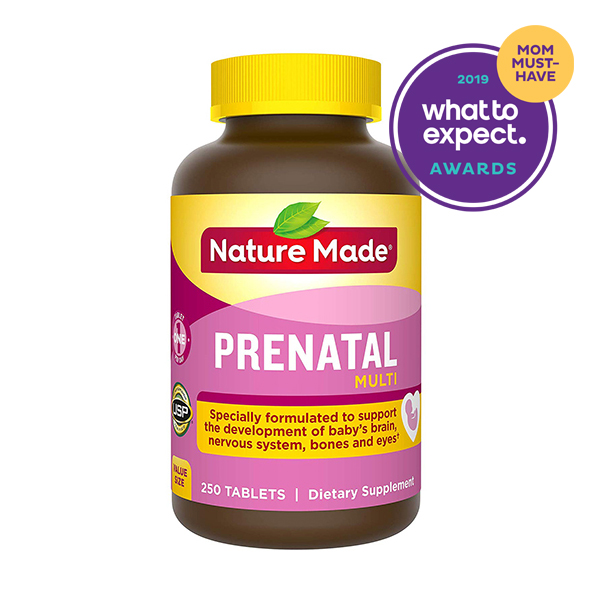 With the onset of pregnancy, throughout its entire duration and during breastfeeding, the dose increases to 250 mcg per day. But usually the coverage of the need for iodine is distributed as follows: we get 50 micrograms from food, and take 200 micrograms in the form of a drug. In case of thyroid diseases, consultation with an endocrinologist is mandatory.
With the onset of pregnancy, throughout its entire duration and during breastfeeding, the dose increases to 250 mcg per day. But usually the coverage of the need for iodine is distributed as follows: we get 50 micrograms from food, and take 200 micrograms in the form of a drug. In case of thyroid diseases, consultation with an endocrinologist is mandatory.
Calcium 1000 mg per day should be taken daily from food or mineral supplements if the woman does not consume calcium-containing foods.
Omega-3 polyunsaturated fatty acids (PUFAs). WHO still does not recommend the additional intake of this component during pregnancy and insists on a healthy diet. A sufficient intake of omega-3 is necessary for the proper formation of the organs of vision and the brain of the unborn child. In 2018, a study was conducted in which several thousand pregnant women participated. A diet high in omega-3s has been shown to reduce the risk of preterm birth from 7% to 2%, as well as the risk of having small babies.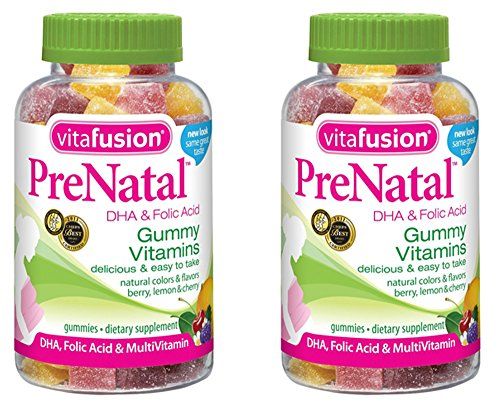
An excellent source of omega-3-PUFAs are salmon fish, tuna and seafood. If you use them 2 times a week, then you do not need supplements and dietary supplements with this component. Everyone else should think about changing the diet or taking them additionally (of course, after consulting a doctor).
- You talked about the possible consequences of a lack of folic acid. And what can a deficiency of trace elements lead to in a pregnant woman and an unborn child?
- Children born to mothers with mild to moderate iodine deficiency are more likely to have behavioral disorders in the form of attention deficit hyperactivity disorder. Severe iodine deficiency in pregnant women is fraught with an increase in the frequency of stillbirth and infant mortality, miscarriage, the birth of underweight children, children with mental retardation.
Lack of calcium also leads to negative consequences: bone density decreases, which leads to the development of osteoporosis in menopausal women and an increased risk of fractures in old age. Possible heart rhythm disturbance, muscle spasms, convulsions. In pregnant women, especially those at risk, the likelihood of developing gestational hypertension (high blood pressure) and preeclampsia (a pathology in which blood pressure rises during pregnancy, edema is formed, and protein appears in the urine) increases.
Possible heart rhythm disturbance, muscle spasms, convulsions. In pregnant women, especially those at risk, the likelihood of developing gestational hypertension (high blood pressure) and preeclampsia (a pathology in which blood pressure rises during pregnancy, edema is formed, and protein appears in the urine) increases.
Calcium is best absorbed from dairy products, 2-3 servings of which will provide the daily intake. 1 serving is equal to 200 ml of milk, kefir, curdled milk, fermented baked milk, or 200 g of yogurt, or 100 g of cottage cheese or 40 g of cheese.
Iron deficiency in the mother's body before pregnancy and in its early stages can "cross out" all subsequent efforts of parents and teachers in teaching children. The developing brain of a future baby is especially sensitive to a lack of iron in the body, including in the case of its hidden deficiency, when hemoglobin is normal, and there are few iron reserves.
Many people know that iron is necessary for the formation of hemoglobin, which is able to bind oxygen.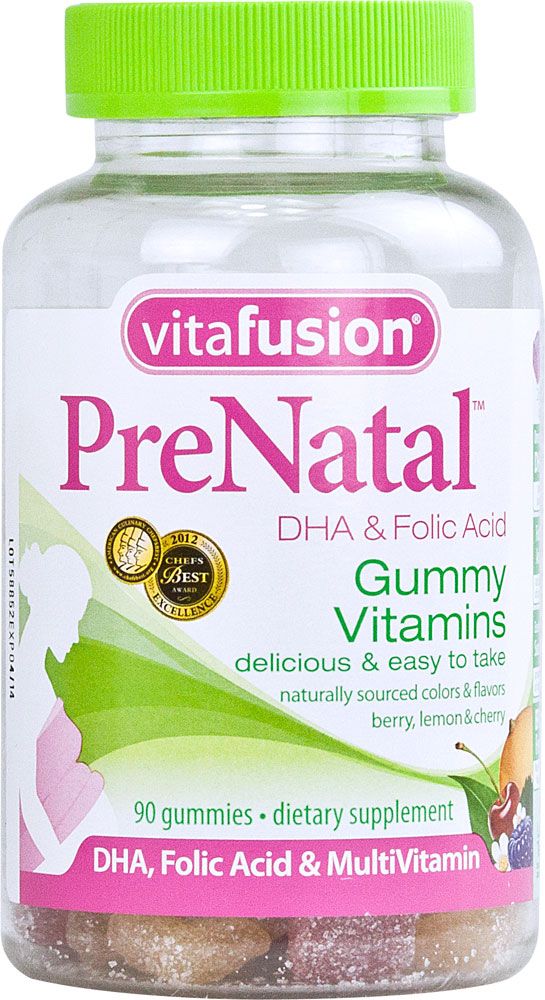 Hemoglobin is found in red blood cells, which carry oxygen to the cells. And if there is little oxygen, then the cells suffer. Imagine feeling out of breath. So it is here: the brain cells of a still little man (3-12 weeks of pregnancy), lacking oxygen, divide more slowly, because of which neural connections are simplified, the gray matter suffers, and your baby will no longer become a genius, even if you responsibly began to take iron supplements after 12 weeks of pregnancy.
Hemoglobin is found in red blood cells, which carry oxygen to the cells. And if there is little oxygen, then the cells suffer. Imagine feeling out of breath. So it is here: the brain cells of a still little man (3-12 weeks of pregnancy), lacking oxygen, divide more slowly, because of which neural connections are simplified, the gray matter suffers, and your baby will no longer become a genius, even if you responsibly began to take iron supplements after 12 weeks of pregnancy.
— Can I take prenatal vitamins without a doctor's prescription?
— No. I recommend taking vitamins only after consulting a doctor if they are deficient. Among persons who may be at increased risk of vitamin deficiency:
- obese people;
- vegans;
- having some bowel disease;
- people with low socioeconomic status;
- real hungry
and some others. For these women, an additional intake of vitamins will be justified.
- Can vitamin supplements taken during pregnancy be harmful or useless?
- At the moment there is no evidence that multivitamins prevent the development of any diseases, that they are necessary and useful. That is, they turned out to be ineffective. Vitamins usually contain more than 5 components. And even a very qualified clinical pharmacologist will not calculate all the options for the interaction of active components in a living organism. According to many studies, most multivitamin complexes are not absorbed by the body. They contain components (vitamins and trace elements) that are incompatible with each other: calcium and iron, fat- and water-soluble groups of vitamins, zinc and folate. B1, B6 and B12, although from the same group, are at war with each other or reinforce each other's negative effects. Therefore, if you take vitamins, it is better to take them separately, and only those that are really necessary.
Often the dosages of the components do not correspond to the recommended ones (for example, folic acid is recommended at a dose of 400 mcg per day, and in multivitamins it is often contained in an amount of 200 mcg, etc.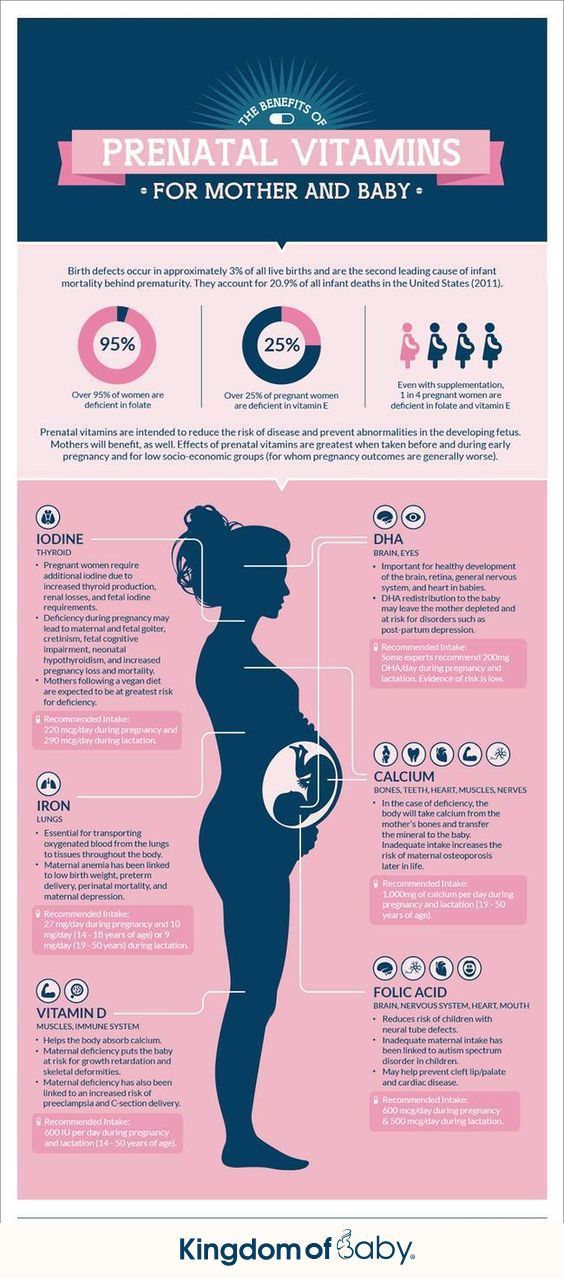 ).
).
All supplements and vitamin complexes containing vitamin A should be avoided due to its possible teratogenic effect (that is, the ability to cause malformations in a child during pregnancy).
There are no natural vitamins on the modern pharmaceutical market. Without exception, all preparations contain vitamins or their analogues, which are obtained synthetically. The natural ones are found only in foodstuffs.
— Do prenatal vitamins have side effects?
— Of course. Firstly, as with any other drugs, they can cause an allergic reaction. Side effects from the gastrointestinal tract are also common: nausea, vomiting, constipation, diarrhea, etc. The load on the liver is high. Excess intake of certain vitamins can lead to cancer.
— Is it possible for a pregnant woman to take vitamins with uterine fibroids? And if so, which ones?
— There are no restrictions and peculiarities in terms of taking vitamins.